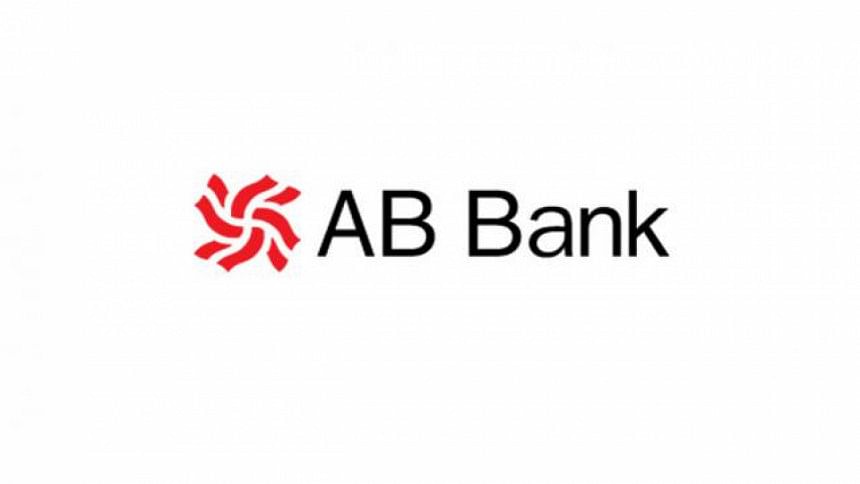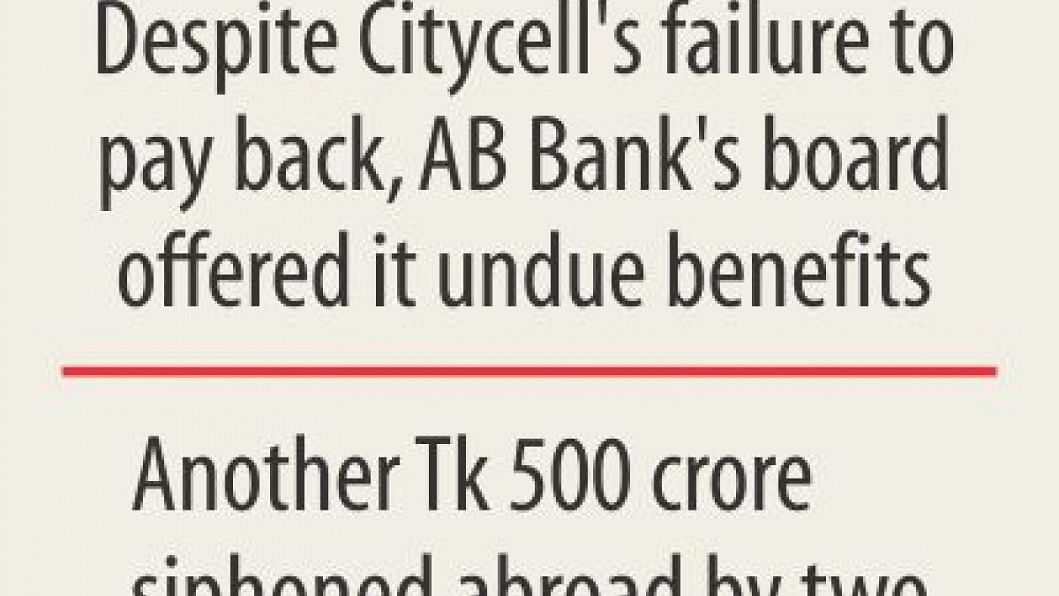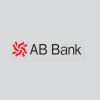Dragged down by directors

The burden of a dead mobile operator, widespread loan fraudulence, mismanagement and influence of a sponsor director were what dragged the once sound AB Bank into the reds.
It was the first private bank in the country making good profits. In fact, AB Bank topped the listed banks in the stock market in terms of earning in 2009.
But the bank suffered a free-fall in 2017 when its profits dried up to an extent that it failed to announce dividend for its shareholders and crash-landed from category A to Z -- a category for poorly performing companies.
Its share price dropped 56 percent in the last two years, coming down close to face value at Tk 10.
The year 2018 was no different, as the bank could not close its account even in January this year. All the financial indicators such as liquidity, loan deposit-ratio and non-performing loan were blinking red.
At the core of its trouble stood two things -- Tk 350 crore loan guarantee given to a telecom company, Citycell, and around Tk 500 crore illegally siphoned abroad by two directors of the bank between 2008 and 2014.
Faced with liquidity crisis and rise in non-performing loan that stood at 7.2 percent in December last year from 4.47 in December 2016, AB Bank management seemed to have learned nothing from their past mistakes.
In December last year, the bank offered special privileges to Citycell, the country's first mobile operator, that damaged the health of the bank as much as the illegal money laundered abroad did.
In both scams, M Morshed Khan, owner of Pacific Bangladesh Telecom Limited (PBTL) which used the brand name Citycell and also founder chairman of AB Bank, was involved, according to Anti-Corruption Commission investigation.
Citycell had taken Tk 350 crore from eight banks and financial institutions with guarantee from AB Bank in 2011. And as Citycell failed to pay back the loan, the liability fell on AB Bank.
Citycell's outstanding loan with AB stood at Tk 705 crore as of October last year.
Finally, in December last year, the bank's board decided to waive interest of around Tk 229 crore on the loan and rescheduled the telecom's Tk 476.39 crore loan for 10 years.
Citycell made only 0.21 percent of the down payment instead of the Bangladesh Bank rule for 5 percent. It got a three-year grace period on the next repayment.
Incidentally, Morshed Khan, former foreign minister and BNP vice-chairman, has two nominated directors on the bank's board that made the decision.

When the proposal for loan rescheduling was sent to the BB, the central bank also took a lenient view, allowing a 3 percent down payment, deviating from its own rule for 10 percent. The company was also allowed interest waiver.
Interestingly, all this was done with the knowledge that Citycell has no capacity to pay off its loans.
“The Pacific Bangladesh Telecom Limited has no income generating sources to pay off the bank's liabilities,” AB itself wrote in its letter to the BB at the time.
Asked to comment on the privileges given to Citycell, Tarique Afzal, acting managing director of the bank, remained tight-lipped, claiming it was a “confidential information”.
But he admitted the bank was in poor health, saying some financial indicators deteriorated due to mismanagement.
“We are trying to improve its health by intensifying loan recovery from the defaulters,” he added.
Morshed Khan said all his properties remained mortgaged against the loan.
He added they would continue the instalment against the rescheduled loan by selling the mortgaged assets.
“We have no plan to revive Citycell because a huge amount of revenue remained due with the government,” he said, replying to a question.
Citycell is now facing an embezzlement case filed by the Anti-Corruption Commission, which says Citycell took Tk 350 crore from eight banks and financial institutions with AB's guarantee between 2011 and 2015 for “dishonest purposes for financial benefit through fraud, corruption and misuse of power”.
The ACC arrested Citycell CEO Mehboob Chowdhury in July 2017 in the case filed with Banani Police Station in June that year. The Commission also framed charges against Morshed Khan, his wife Nasrin Khan and AB Bank's former managing director Moshiur Rahman Chowdhury in the same case. All of them are on bail.
Citycell's operations closed in October 2016 after the telecom regulator cancelled the spectrum of Bangladesh's first mobile operator that served users for more than two decades.
The Bangladesh Telecommunication Regulatory Commission shut down the company as it failed to pay its dues of Tk 477.69 crore in time.
PROFIT FALLS
AB Bank's profit drastically fell in 2017 after two big scams. The profit tumbled to Tk 2.96 crore in 2017, 44 times lower than Tk 130.46 crore the previous year, according to the bank's statement.
In 2009, when share market boomed, the net profit of AB Bank was Tk 342 crore, which was the highest among all the listed banks, according to Dhaka Stock Exchange.
MANAGEMENT CRISIS
The bank has been running without a managing director since Moshiur resigned from the post in October last year, when he was just 17 months into his three-year term.
The bank having a huge size of exposure above Tk 23,000 crore is running with only two deputy managing directors. Other banks with the same portfolio have six to seven top executives, including additional and deputy managing directors.
The bank has been going through a management crisis since 2017 after the ACC filed a case against its three former managing directors -- Kaiser Ahmed Chowdhury, Shamim Ahmed Chowdhury, M Fazlur Rahman -- and then incumbent managing director Moshiur Rahman Chowdhury over the Citycell loan scam.
AN AILING BANK
AB Bank is experiencing a severe liquidity crisis, which is reflected in daily inter-bank borrowing. In January, every day inter-bank dependency of the bank was between Tk 944 crore and Tk 2,200 crore, according to the bank's statement.
The advance deposit ratio of the bank remained above 90 percent since last year, in violation of the approved limit of 85 percent. The ratio stood at 91 percent at the end of January this year.
Aggressive lending and erosion of deposits led the bank in such a fund crisis.
The bank's deposit declined by Tk 132 crore to Tk 23,221 crore in September last year from Tk 23,353 crore in December 2017, according to Bangladesh Bank data.
On the other hand, the size of exposure increased by more than Tk 1,000 crore during the same period.
The bank saw a sharp rise in non-performing loan by Tk 697 crore in the first nine months of last year and stood at Tk 1,664 crore in December, central bank data show.
The NPL rate stood at 7.2 percent in December last year from 4.47 in December 2016.
Moreover, the bank has defaulted loan of Tk 274 crore in its Offshore Banking Unit as of December last year, according to BB data.

 For all latest news, follow The Daily Star's Google News channel.
For all latest news, follow The Daily Star's Google News channel. 








Comments